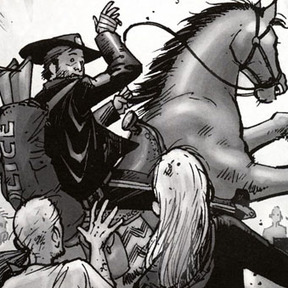And someone from the unwashed masses shouted, “Great, now Ryan will tell us why zombies can’t be real and ruin everything fun in the world!” Not so, gentle naysayer. Zombies are real and useful in SCIENCE. Even the fake ones are useful, can you believe it?!
 Before you lay awake with your machete tonight I will clarify on zombies being real. While George Romero really popularized his concept of the undead ghoul the concept predates him and his films. In voodoo a mystic can revive the dead, and they then become his slave. The ace in the hole is a neurotoxin generally derived from a blowfish (fugu for the sushi lovers among us). It’s the ole Juliet, Death of Superman trick where the body shuts down enough to seem dead, even if it ain’t. Dude gets buried. Few days later the witch-doctor/blank-lantern says “RISE!” and they dig the poor sucker up. The neurotoxin, as the name suggests, damages the brain and nervous system, leaving the the voodoo priest with a barely functional shell of a human. Pretty cool, right? Be careful eating sushi in Haiti, all I’m saying.
Before you lay awake with your machete tonight I will clarify on zombies being real. While George Romero really popularized his concept of the undead ghoul the concept predates him and his films. In voodoo a mystic can revive the dead, and they then become his slave. The ace in the hole is a neurotoxin generally derived from a blowfish (fugu for the sushi lovers among us). It’s the ole Juliet, Death of Superman trick where the body shuts down enough to seem dead, even if it ain’t. Dude gets buried. Few days later the witch-doctor/blank-lantern says “RISE!” and they dig the poor sucker up. The neurotoxin, as the name suggests, damages the brain and nervous system, leaving the the voodoo priest with a barely functional shell of a human. Pretty cool, right? Be careful eating sushi in Haiti, all I’m saying.
With that out of the way we can get into the math. WAIT! Don’t stop reading. I promise it’s interesting. If you’re thinking like a scientist you can model zombies like a disease that spreads in a very peculiar, but not entirely implausible way (this is the part where I said even the fake ones were useful). This field of research is called epidemic mathematics. People think about this, run simulations and then publish the results. Why? Well it gets media attention because it’s about zombies, of course. How else do you get people to care about epidemic mathematics? But it is also good research in its own right so let’s take a look at what the results tell us.
It just so happens that my close personal friend and occasional podcast cohost, Ben Tippett, has written up a paper on this very subject. The paper is 37 pages long so I don’t expect you to read it, but he did write a blog post on it that you mind find a bit more digestible. I’ll try to further distill the information under the guidelines provided by The Walking Dead.
 The first thing any good biomath modeler does is set their parameters. This is especially important as most zombie stories have some sort of twist to make them unique. In the case of Kirkman’s opus the plague is airborne (unclear if it’s a bacterium, virus, prion, etc.) and it causes the dead to become zombies. There is a separate mechanism by which the bite of a zombie kills a living person. Since Rick was able to ride a horse early in the series we can assume other mammals (and thereby most other animals) remain unaffected.
The first thing any good biomath modeler does is set their parameters. This is especially important as most zombie stories have some sort of twist to make them unique. In the case of Kirkman’s opus the plague is airborne (unclear if it’s a bacterium, virus, prion, etc.) and it causes the dead to become zombies. There is a separate mechanism by which the bite of a zombie kills a living person. Since Rick was able to ride a horse early in the series we can assume other mammals (and thereby most other animals) remain unaffected.
This most closely resembles a Romero-type situation (as opposed to Max Brooks or 28 Days Later scenarios). However, the zombies themselves are not the only factor. The response of the living makes huge difference! Do you stay mobile? Hunker down? Rural? Urban? Group? Alone? Attack? Defend? Forage? The number of possible combinations makes calculating this stuff increasingly difficult.
I’ll be blunt with you guys. At a certain point, strategy makes little difference. Odds are humanity is done when the dead come back with a vengeance. But if you wanted to make a strong showing of it The Walking Dead is not a horrible model. The main thing is you have to be good at killing zombies. Here’s why; like with our prehistoric ancestors, survival quickly becomes about two things: food and not getting killed. In the zombie world not getting killed means you go for the head first, no fucking around (avoiding densely populated areas, i.e. cities, is also a good idea). But you also need to eat, and chances are much less food is being produced, if any is still being produced at all.  There has to be a balance between these two activities but it may surprise you that the models suggest that you should focus on killing zombies a bit more than finding food. The thinking is the people that suck at zombie combat will quickly themselves become zombies. Assuming you’re smart enough to stick to rural areas the goal should be to keep the odds of a zombie-based surprise attack at a minimum by killing every last roamer you can. Then you’re free to forage for food. The population of the living will be so low that it wouldn’t be that difficult to scrounge up a can of something edible. The bigger problem is staying alive long enough to do so.
There has to be a balance between these two activities but it may surprise you that the models suggest that you should focus on killing zombies a bit more than finding food. The thinking is the people that suck at zombie combat will quickly themselves become zombies. Assuming you’re smart enough to stick to rural areas the goal should be to keep the odds of a zombie-based surprise attack at a minimum by killing every last roamer you can. Then you’re free to forage for food. The population of the living will be so low that it wouldn’t be that difficult to scrounge up a can of something edible. The bigger problem is staying alive long enough to do so.
In this respect The Walking Dead gets it right. For all the talk of the tirals and tribulations of life in zombie-world the cast rarely complains about eating beans, and never seem so low on food to make it a relevant plot point save for the earliest issues. Their main goal is finding shelters and keeping the immediate population of ghouls to a minimum. I can attest from personal conversations that Kirkman reads no external zombie literature, not out of spite so much as creative necessity, so the fact that he hits the nail on the head is a testament to his skill as a story-teller.
I encourage you yet again to go read Ben’s writings on the subject in both blog and paper form. He has graphs and is generally way smarter than me in this area (and many many others). I don’t know if this dose of realism hinders or entices your excitement for the next issue and the start of the show but I for one am looking for as many sources as I can find for how to survive the obviously inevitable apocalypse and it’s nice to know our favorite medium of funny books provides some legitimate advice.
Ryan Haupt plans on sticking with the mathematicians when the world ends. They’ll model the situation and he’ll get to do all the zombie-killing. Listen to him, and occasionally Ben, talk about zombies and other nonsense on the podcast Science… sort of.


I’m not good at math, but i love that it can expalin how something like the zombie plague can progress from initial infection to the hell-in-a-hand-basket world most zombie stories are set in.
Cool article. I’ll definitely be reading that paper once i get through my uni exams. Sigh.
Great as usual, Ryan. I was worried I might be zombie-articled-out (this has been coming up a lot lately), but you still had a fresh and interesting take on the issue.
But stay away from my can of beans if the zombies attack.
This is SO COOL!
Great article. It got me thinking. I hope the origin of the zombie infestation is never revealed in The Walking Dead. In my mind, I like to imagine that they were started in West Baltimore, by Chris Partlow & Snoop from "The Wire", who would kidnap people, bring them to vacant buildings and turn them into zombies.
Ryan, you’ve got to stop playing God. You’re creating something new!
As an iFanbasus Paleopalis, I can’t be alone. There are others. There have to be others.
Can’t wait to read the paper when I get home. (PhD candidate by night, science editor by day, yo, I ain’t scared.)
Awesome article. I love the zombie discussion. It’s great to have with friends at a party when you’re alla bit drunk.